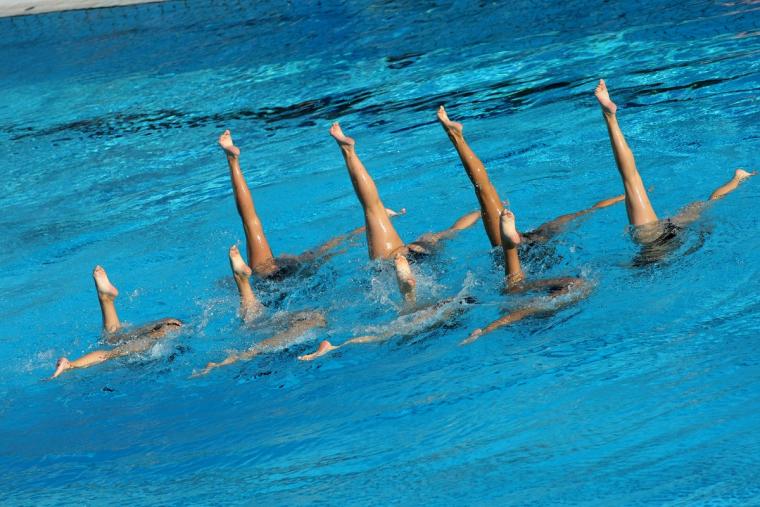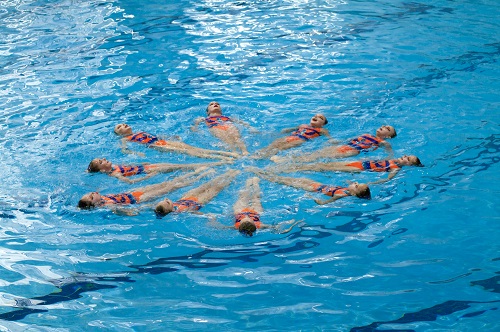
The historically female sport of artistic swimming is about to get an injection of testosterone in Paris in 2024. (If you’re counting, that means there will be exactly one female-only sport left in the Games: rhythmic gymnastics.)
According to World Aquatics, men will be eligible to compete in the team event. There are eight competitors per team. The new rules will permit a maximum of two men to compete in each team at the Olympic Games. Ten teams are expected to compete.
While this will mark the first time that men have been eligible to be included in a team at the Games, they have been allowed to compete in the sport at the FINA World Aquatics Championships since 2015.
The USA’s Bill May has long lobbied for the inclusion of men in the sport. He was the first ever male World Champion in the inaugural mixed duet technical event at the FINA World Aquatics Championships in 2015. These days, he is a coach, and is ecstatic to see the change finally implemented at the podium level of the Games.
"The inclusion of men in Olympic Artistic Swimming was once considered the impossible dream,” he told reporters at World Aquatics. “This proves that we should all dream big. The male athletes have endured. Now, through their perseverance and the help and support of so many, all athletes may stand alongside each other equally, reaching for Olympic glory."
A male athlete potentially competing in 2024 is Giorgio Minisini of Italy; Minisini was the World Champion at the FINA World Aquatics Championships in the mixed duet technical routine in 2017 and 2022. And he was (unsurprisingly) positive about the development as well:
"This announcement marks a milestone in Artistic Swimming history. Our sport's evolution towards inclusivity is going on fast forward, and this decision from IOC and World Aquatics will help us become an example for the whole Olympic movement. As one of the most popular sports in the Games, we are ready to share the Olympic motto around the world louder than ever: Faster, Higher, Stronger – Together.”
 It hasn’t been all smooth sailing, though, despite the fact that the IOC has long pushed for mixed gender sports, so don’t look for universal acceptance. Plenty of objections (as well as eyebrows) have been raised along the way. In 2015, for example, there was pushback from Russia, long a powerhouse on what was then called the synchronized swimming scene:
It hasn’t been all smooth sailing, though, despite the fact that the IOC has long pushed for mixed gender sports, so don’t look for universal acceptance. Plenty of objections (as well as eyebrows) have been raised along the way. In 2015, for example, there was pushback from Russia, long a powerhouse on what was then called the synchronized swimming scene:
"I'd probably have decided against it. I wouldn't have approved this issue," Angelika Timanina, an Olympic champion in 2012 and eight-time world champion with Russia's national team, told The Associated Press. "We're used to classical synchronized swimming, feminine synchronized swimming."
Synchronized swimming should be "a purely feminine sport" and introducing mixed competition is "mistaken," Sports Minister Vitaly Mutko told Russian agency R-Sport. He even hinted that the introduction of mixed duets was the result of pressure from Russia's rivals. "Evidently, some kind of group of countries has pushed this through," he said.
A Yahoo! Sports article noted the inclusion of mixed-gender events “could threaten Russia's total dominance of a sport in which it has won every available Olympic gold medal this century. It also challenges gender roles in a country whose government has made a point of promoting images of traditional masculinity.”
Olympic 100-meter butterfly silver medalist Evgeny Korotyshkin told Russian media that he might cry at the sight of a male synchronized swimmer's "hairy legs poking out of the pool."
However, Elena Markoch, a coach who has trained several of Russia's Olympic champions, said Russians will eventually warm to male synchronized swimmers with the passion currently shown to the country's male figure skating stars.”
Expect the change to start being felt at the club level, and to filter through all levels of artistic swimming, up to and including collegiate programs. Additionally, look for rec and league programs to open their ranks to boys and men as well. There will be a need for trained coaches as well.
We hear it over and over. Change is the only permanent thing. This too shall pass.
Changing any sport, particularly one contested at a high level, is difficult and pushback can be expected (we’re looking at you, modern pentathlon) but over time, acceptance will come. After all, women did not always compete in the marathon or in ice hockey (among many other sports.)

